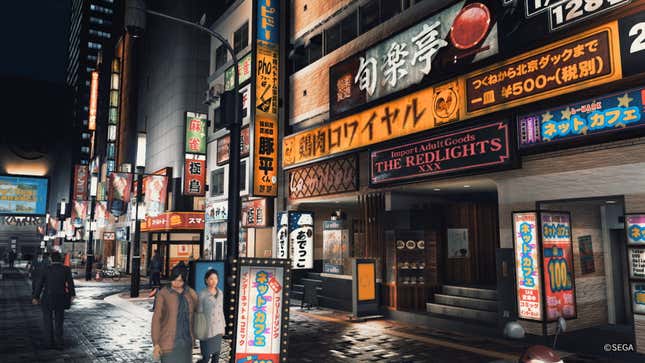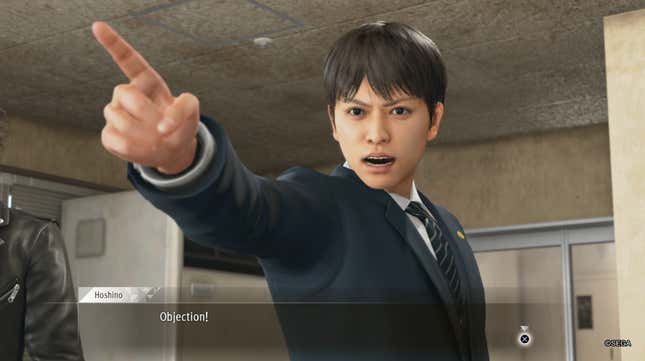Yakuza 6 closed the book on the story of fabled gangster Kazuma Kiryu, but Ryu Ga Gotoku Studio’s relentless release schedule cannot be stopped. While we know the developer is capable of different (and brilliant) things—see Binary Domain—they’ve decided to stick with the Yakuza formula in all but name with their latest game Judgment, out today on PlayStation 4.
The foundations of Judgment are almost identical to those found in the Yakuza series, to the point where this feels almost like a mod or a reskin than a brand new game. You’re still given almost free reign over the fictional Tokyo distruct of Kamurocho, and you’re still running around getting into fistfights, buying energy drinks from convenience stores and getting caught up in a very elaborate tale about mobsters (try as they might, even with a name change, the studio just can’t stay away from the Yakuza).
It is, at least, a new cast and a new story. Gone is the cartoonish excess of Kiryu and friends, replaced with a more earthy and earnest protagonist named Takayuki Yagami, a disgraced lawyer now working as a private eye. He ushers in a change of tone that permeates the entire game, for better and worse.
Better first! The flamboyance of the Yakuza series, and its constant need to one-up itself in terms of scale and ridiculousness, had got a little tiring by the sixth game, whose sunken battleship plot and unremarkable villains were perhaps evidence of a franchise in need of some rest and reevaluation.
Judgment dials things right back. Yagami’s tale may be pinned to a massive and often farcical conspiracy, but its beats and conclusion are really just a very personal and small-scale story about a man out for redemption. In doing so it also keeps the slapstick and bombastic set pieces to a minimum, a handful of literally explosive acts aside.

Notably for virtual tourists, for the first time since Yakuza 2 we never leave the streets of Kanurocho during the course of the game, and the usual sprawling cast of gangsters has been replaced with a smaller, more manageable roster of friends and enemies that gives each far more space to grow, and for us to get to know them.
All of which made Judgment a far more intimate experience than any of the recent Yakuza games, and I appreciated that immensely. The brevity even extends to the game’s overall design: this is a leaner, meaner affair, with most sidequests relegated to a jobs board in your office (so you don’t continually run into them on the streets) and a main story that can be wrapped up in around 20-25 hours. Even the series’ notoriously lengthy cutscenes have been trimmed, with few outside of the most pivotal moments clocking in at any longer than a few minutes.
The downside to this tonal shift is that there’s now a strange gulf between the narrative that’s been crafted and the actual experience of playing. This is still very much a Yakuza game at heart, so you spend most of your time kicking bikes into dude’s faces, facing down hordes of street thugs with your bare hands and running around performing hilarious side-missions.
That kind of stuff made sense when the characters you were playing as were as off-kilter as the action on screen, but here there’s a dissonance, where the feats you’re pulling off in combat are at odds with the more sombre and grounded action taking place in cutscenes. I mean, it’s explained very briefly that hey, your ex-lawyer detective guy also knows martial arts, but there’s a difference between “have done some karate” and “can beat the shit out of 12 cops without breaking a sweat”.

Not helping matters here is that in attempt to bridge that gulf, Ryu Ga Gotoku Studio have implemented some new systems into the game designed to play on its crime-solving, court case-winning vibe, which range from pixel hunts to Phoenix Wright-style accusations and presentations of evidence.
Nearly all of them suck, and do little but place a handbrake on your adventures, as though they were simply implemented for the sake of it, to differentiate this slightly from the Yakuza games, rather than because they genuinely added something to the experience. The accusations are the most disappointing, since they can’t be failed and as such are of little consequence, but the worst are the seemingly endless tailing/stealth sections, which are broken, take forever and are generally a nightmare to endure.
It’s been suspected for a long time now, but free of Yakuza’s history Judgment finally gives us a chance to prove it: the real star of these games has never been their cast but their setting. Kamurocho is a video game wonder, whose consistency across games, despite its continual changes, makes it the PlayStation equivalent of a comfortable pair of slippers. And in Judgment, it’s never looked better.
Setting the entire game here, without the customary vacations to places like Osaka or Okinawa that we’ve gotten used to lately could have felt cramped, but the distance Judgment puts between itself and its Yakuza past lets us see the city in a new light. It’s a strangely comforting—and novel in an industry that’s always desperate to take you to new places—experience to be able to revisit some of the key locations of a series that’s over 15 years old, and what in a Yakuza game was a key location is in Judgment just some bar you can buy a beer in. The importance of the place means nothing to Yagami, of course, it’s all there for you.
Kamurocho has a sense of home, and place, that’s just incredible. I’ve always wanted to complain about Yakuza’s lack of a true fast travel system (you can only bounce around the borders of the district), but then I know deep down that the games are better without it, as being forced to walk the city’s streets is the best way to get to know them.
I moved house last month, and it’s both terrifying but also amazing that over the course of this review I found I knew the streets of Kamurocho better than those of my actual neighbourhood. And changes to Judgment’s streets—the presence of the modern eyesore Kamurocho Hills in particular—are as jarring as any major development in the real world.
Playing Judgment and Yakuza are like looking at the same photo—in this case the streets of Kamurocho—through two different filters. The presentation might be slightly different, and the tone a little off when you’re comparing them, but the underlying image is identical, from their geography to their face-kicking.
The Yakuza formula, so unchanged here beneath the additions of detective distractions, is still a very good one despite its age. I really enjoyed my time with Judgment, partly because I took a shine to the new, more human cast, but mostly because the basic Yakuza building blocks of “smashing traffic cones into ribs” married with “a soap opera about angry dudes” is still loads of fun.
It would have been nice if those two things could have been stitched together a little more neatly, but then subtlety has never been a Yakuza strongpoint.




